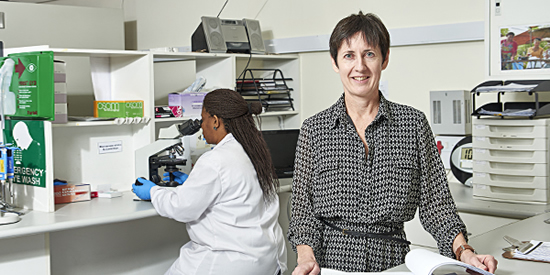HIV study shows new injection is more effective than current daily HIV pill to prevent HIV in women
Early unblinding of the of long-acting cabotegravir (CAB LA) is a milestone for prevention of HIV among women in sub Saharan Africa.
10 November 2020 - Wits University - Researchers from the HIV Prevention Trials Network (HPTN) announced today that data from the clinical trial of the pre-exposure prophylaxis (PrEP) regimen of long-acting cabotegravir (CAB LA) injections once every eight weeks was safe and superior to the daily oral tenofovir/emtricitabine (TDF/FTC), currently used for HIV prevention among women in sub Saharan Africa.
The trial, known as the HPTN 084 trial was headed by Dr Sinead Delany-Moretlwe, a research professor at the University of the Witwatersrand, South Africa and director of research at the Wits Reproductive Health & HIV Institute (Wits RHI).
This finding was made on November 5, 2020, during a planned interim review of the HPTN 084 study data by an independent Data and Safety Monitoring Board (DSMB). Consequently, the DSMB recommended that the study sponsor ― the National Institute of Allergy and Infectious Diseases (NIAID), part of the National Institutes of Health ― stop the blinded phase of the trial, which was originally designed to continue through 2022, and share the results. NIAID has accepted the DSMB's recommendations and is releasing the results now to serve the interests of public health. The study investigators will report more detailed information about the study findings, including more comprehensive data, as soon as feasible.
“The results from HPTN 084 are incredibly important for women in Africa where lowering HIV incidence remains a priority,” says HPTN 084 protocol chair Delany-Moretlwe. “We know that adherence to a daily pill continues to be challenging, and an effective injectable product such as long-acting CAB is a very important additional HIV prevention option for them. We are grateful to the women who volunteered for this study and the research staff, as this study would not have been possible without their commitment to HIV prevention.”
 Volunteers from the HPTN 084 trial at the trial sites before the trial commenced. All the participants of the trial were uninfected prior to the commencement of the trial.
Volunteers from the HPTN 084 trial at the trial sites before the trial commenced. All the participants of the trial were uninfected prior to the commencement of the trial.
(Credit: HPTN)
Overall, HPTN 084 enrolled 3,223 cisgender women at research sites in Botswana, Eswatini, Kenya, Malawi, South Africa, Uganda, and Zimbabwe. Fifty-seven percent of the participants were under the age of 25, the average age of participants was 26 years, 82% were not living with a partner, 55% reported two or more partners in the past month, and 34% reported having a primary partner who is living with HIV or having an unknown HIV status.
A total of 38 HIV infections occurred during follow-up, with four infections in the CAB LA arm (incidence rate 0.21%) and 34 infections in the TDF/FTC arm (incidence rate 1.79%). The hazard ratio in the CAB LA versus TDF/FTC arm was 0.11 (95% CI 0.04-0.32).
Approximately nine times more incident HIV infections occurred in the TDF/FTC arm than in the CAB arm. These results meet the statistical criteria for superiority of CAB LA compared to TDF/FTC in the HPTN 084 study population. The higher than expected level of adherence to TDF/FTC throughout the study and overall low incidence rate in both arms of the study clearly demonstrate both drugs were highly effective at preventing HIV acquisition
Wits University has long been recognised as a global leader in HIV research and has contributed a vast amount of knowledge in the fight against the pandemic.
“This announcement demonstrates the important role that research entities and research-intensive universities play in transforming society and saving human lives. Universities like Wits continue to generate high-quality, locally-relevant knowledge that match and exceed global standards. Congratulations to the Wits RHI team for leading world-class research from Africa that addresses the burden of disease on the continent – this incredible breakthrough will certainly save the lives of many women living in sub-Saharan Africa, and beyond,” says Professor Zeblon Vilakazi, Vice-Chancellor and Principal Designate of Wits University.
 Professor Helen Rees is Executive Director of the Wits Reproductive Health and HIV Institute at the University of the Witwatersrand in Johannesburg where she is also a Personal Professor in Obstetrics and Gynaecology, and Co-Director of the Wits African Local Initiative for Vaccinology Expertise (ALIVE)
(Credit: Wits University)
Professor Helen Rees is Executive Director of the Wits Reproductive Health and HIV Institute at the University of the Witwatersrand in Johannesburg where she is also a Personal Professor in Obstetrics and Gynaecology, and Co-Director of the Wits African Local Initiative for Vaccinology Expertise (ALIVE)
(Credit: Wits University)“In the past 30 years, Wits researchers and clinicians have been at the forefront of the global fight against HIV. The outcome of this research is again a confirmation that South Africa has the ability to compete and collaborate with the best in the world. It is research such as this that will contribute to saving and improving the lives of millions of people around the world – and especially in Africa. This outcome makes all the time, hard work and money invested in research efforts truly worthwhile,” says Professor Martin Veller, Dean of the Faculty of Health Sciences at Wits University. “The remarkably low risk of becoming infected by HIV while on long-acting cabotegravir amongst study participants makes this modality of prophylaxis clinically, very attractive.”
The HPTN 084 results, along with the recent positive opinion of the dapivirine (DPV) ring by the European Medicines Agency (EMA) represent a real opportunity to change the course of the HIV epidemic for women in sub-Saharan Africa.
“These results are a milestone for prevention of HIV among women at risk of HIV worldwide and especially for women in sub Saharan Africa. If we are to turn the tide on the HIV epidemic, we will need prevention options that work for women in sub-Saharan Africa. These findings provide great hope and motivation for additional studies to show safety an acceptability in adolescents, pregnant and breastfeeding women,” says Professor Helen Rees, Executive Director of Wits RHI.
Earlier this year, a sibling study called the HPTN 083 clinical trial showed that a PrEP regimen containing CAB LA injected once every eight weeks was superior to daily oral TDF/FTC for HIV prevention among cisgender men and transgender women who have sex with men.
“The results from HPTN 084 along with the HPTN 083 results released earlier this year show how far we have come in the fight against HIV. A highly effective product like CAB LA that does not require a daily pill can be an important part of ending the epidemic globally,” says Dr Myron Cohen, HPTN co-principal investigator and director of the Institute for Global Health at the University of North Carolina in Chapel Hill.
The HPTN 084 study is jointly funded through a unique partnership of NIAID, NIMH the Bill & Melinda Gates Foundation, and ViiV Healthcare. Study drugs are provided by ViiV Healthcare and Gilead Sciences, Inc.
 Prof. Sinead Delany-Moretlwe Wits RHI CROWN study
Prof. Sinead Delany-Moretlwe Wits RHI CROWN study
(Credit: Wits University) ###
About HPTN
The HIV Prevention Trials Network (HPTN) is a worldwide collaborative clinical trials network that brings together investigators, ethicists, community members and other partners to develop and test the safety and efficacy of interventions designed to prevent the acquisition and transmission of HIV. NIAID, NIMH, Office of The Director, and NIDA, all part of NIH, co-fund the HPTN. The HPTN has collaborated with more than 85 clinical research sites in 19 countries to evaluate new HIV prevention interventions and strategies in populations that bear a disproportionate burden of infection. The HPTN research agenda – more than 50 trials ongoing or completed with over 161,000 participants enrolled and evaluated – is focused primarily on the use of integrated strategies: use of antiretroviral drugs (antiretroviral therapy and pre-exposure prophylaxis); interventions for substance abuse, particularly injection drug use; behavioral risk reduction interventions and structural interventions. www.hptn.org
HIV Prevention Trials Network Factsheet
Biographies
Professor Helen Rees
Professor Helen Rees is internationally renowned for her research and policy work in vaccines, HIV, and reproductive health. She chairs the principal vaccine advisory group to the World Health Organization (WHO) Regional Office for Africa, known as the African Regional Immunization Technical Advisory Group (RITAG). She is a member of the board of Global Alliance for Vaccines and Immunisation (GAVI) and she chairs GAVI’s Programme and Policy Committee. She serves on the board of the Coalition for Epidemic Preparedness (CEPI) and chairs its Scientific Advisory Committee. Rees is a member of the Governance Committee in the Covid-19 Clinical Research Coalition, a member of the WHO International Health Regulations (IHR) Emergency Committee on Covid-19, as well as of the WHO Strategic Advisory Group of Experts (SAGE) on the Covid-19 Vaccine. Rees is appointed to various South African ministerial committees that inform the Minister of Health on Covid-19. She also chairs the WHO IHR Emergency Committee on Polio and co-chairs the SAGE Ebola Vaccine Committee. She is Chair of the South African Health Products Regulatory Authority. Her primary role is as the Executive Director of the Wits Reproductive Health and HIV Institute at the University of the Witwatersrand, where she is also an ad hominem professor of Obstetrics and Gynaecology and Co-Director of the Wits African Leadership in Vaccinology Excellence Flagship programme. Among multiple accolades, she received the Order of the Baobab, one of South Africa’s highest honours, and was awarded the Order of the British Empire. Her qualifications include GCOB, OBE, MB BChir, MA (CANTAB), MRCGP, DCH, DRCOG mASSAf.
Professor Sinead Delany-Moretlwe
Professor Sinead Delany-Moretlwe, MBBCh PhD DTM&H is Professor and Director: Research at Wits RHI at the University of the Witwatersrand, Johannesburg. A South African-born medical doctor, her research has focused on the intersections between sexual and reproductive health (SRH) and HIV, especially in adolescents. She has worked on several phase III trials of new HIV prevention technologies, including PrEP and is currently protocol chair of a phase III trial of injectable cabotegravir for HIV prevention in women affiliated to the HIV Prevention Trials Network (HPTN 084). A key thread of all her research has been successfully taking HIV and sexual and reproductive health interventions to scale within the South African and African context. She is an advisor to the South African National Department of Health PrEP technical working group and serves on several WHO and other advisory committees.
###
Contact:
Deborah Minors
Senior Communications Officer | Wits Communications
E : deborah.minors@wits.ac.za
T : +27 11 717 1024
M :+27 72 240 4990
W
: www.wits.ac.za
Source: https://www.wits.ac.za/news/latest-news/research-news/2020/2020-11/hiv-study-shows-new-injection-is-more-effective-than-current-daily-hiv-pill-to-prevent-hiv-in-women.html
"Reproduced with permission - UNIVERSITY OF THE WITWATERSRAND"
UNIVERSITY OF THE WITWATERSRAND
For more HIV and AIDS News visit...
Positively Positive - Living with HIV/AIDS:
HIV/AIDS News |